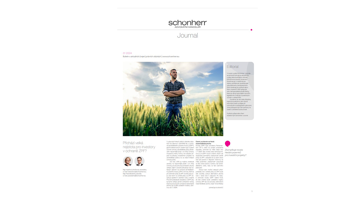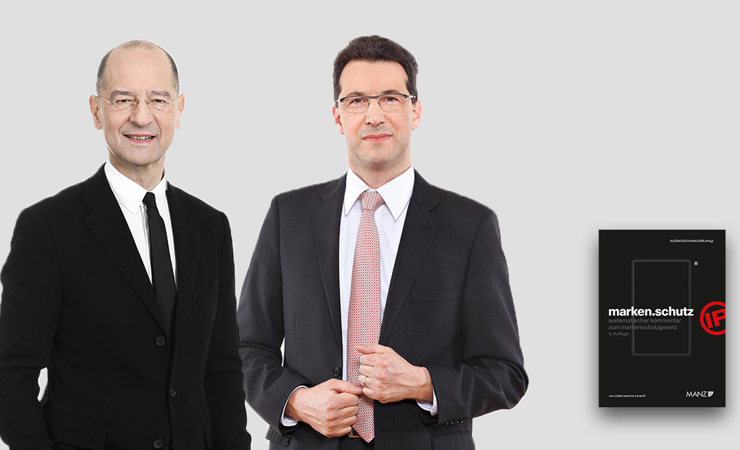Find the latest newsletters, press releases, publications, blog articles and roadmap articles of our ip & unfair competition team:
event
Strengere Regeln gegen Greenwashing: Werbung mit Nachhaltigkeit, Umweltsiegeln und Green Trademarks.
11. März 2026 | 09:00 Uhr | Schottenring 19, 1010 Wien
newsletter
Don't get caught out: preparing your green advertising for the EU's new rules against greenwashing
Keeping track of what is allowed when it comes to green claims, labels and images has become increasingly difficult for advertisers in recent years. While EU lawmakers have invested considerable effort in their fight against "greenwashing", i.e. misleading environmental advertising, the results have left room for confusion.
blog
Jingle all the way to trademark protection: EU ruling opens door for short melodies
In its judgment of 10 September 2025 (Case T-288/24, Berliner Verkehrsbetriebe), the General Court delivered an important ruling on the registrability of short musical jingles as sound marks. This decision has significant practical implications for companies seeking to establish a recognisable acoustic brand identity.
newsletter
When "earlier" is not enough: CJEU sets timing rules for validity of earlier rights in EU trademark opposition and invalidity proceedings
CJEU clarifies when an "earlier trademark" must be valid.
blog
EU: No-Code/Low-Code platforms: future tech, present copyright challenges
Today, most businesses and entrepreneurs are seeking new ways to improve efficiency and reduce overhead costs, especially when much of their commercial activity revolves around an online platform or website. Enter: No-Code and Low-Code platforms.
newsletter
Greenwashing: European Commission FAQs published
As the EU has been working for years to combat greenwashing at the legislative level, the deadline for national transposition (27 March 2026) and subsequent application (27 September 2026) of the new Directive (EU) 2024/825 on the empowerment of consumers ("EmpCo Directive" or "ECGT Directive") is approaching fast. And while advertisers are well advised to design their environmental advertising with foresight, many uncertainties remain as to when and how advertising campaigns and the use of logos will be affected.
newsletter
More than just a trademark? How the EmpCo Directive could affect brands and labels
By 27 September 2026, companies will have to comply with the stricter rules on environmental advertising introduced by the Directive (EU) 2024/825 on the empowerment of consumers ("EmpCo Directive" or "ECGT Directive"). With the various casuistic prohibitions that will be incorporated into the Unfair Commercial Practices Directive, it may be difficult for advertisers to keep track of what is expected of them under this new regime. In particular, it is often overlooked that not only advertisements, slogans and packaging, but also trademarks may fall within the scope of the EmpCo Directive.
event
Österreichischer Patentrechtstag 2025
12. Dezember 2025 | Österreichisches Patentamt, Wien
newsletter
New regime for geographical indications: how producers can secure their rights
1 December 2025 marks a major milestone in European intellectual property law. The EU's new framework for geographical indications (GIs) for craft and industrial products officially enters into force under Regulation (EU) 2023/2411[1]. For the first time, regionally rooted non-agricultural products – including glass, porcelain, ceramics, textiles, metal goods, natural stone, jewellery, woodcraft and more – can be protected under a unified EU-wide GI system.
blog
Austria: The rise of AI-generated music – a challenging legal framework
The possibilities for generating music and sounds using AI applications have become both versatile and impactful in recent years.[1] AI enables the customisation of melodies, lyrics and moods to suit users' needs, making AI-generated music particularly relevant in commercial contexts. In addition to licensing their existing portfolios, many sound platforms now also offer access to AI music databases. Their customers include restaurants and retailers that want to enhance their customers' experience with stimulating background music without relying on "chart hits". In addition, AI-generated music is increasingly used for marketing purposes and advertising.
newsletter
Austria: The rise of AI-generated music – a challenging legal framework
The possibilities for generating music and sounds using AI applications have become both versatile and impactful in recent years.[1] AI enables the customisation of melodies, lyrics and moods to suit users' needs, making AI-generated music particularly relevant in commercial contexts. In addition to licensing their existing portfolios, many sound platforms now also offer access to AI music databases. Their customers include restaurants and retailers that want to enhance their customers' experience with stimulating background music without relying on "chart hits". In addition, AI-generated music is increasingly used for marketing purposes and advertising.
blog
From WhoIs to RDAP: what brand owners and other domain aficionados need to know
When conducting an initial check on who owns a domain name, a WhoIs query has long been the standard procedure. For decades, it has been an essential resource in investigations prior to UDRP or other domain-related proceedings, as well as for simply researching who might be responsible for the website hosted under the domain. Type in a domain name and you could often see who registered it and when it was created.
press release
Austria: Schoenherr successfully defends Uber again and secures final dismissal of damages claim
Schoenherr has successfully represented the international technology and mobility company Uber in long-running litigation against Taxi 40100 (via its subsidiary CC Taxicenter GmbH). After seven years and five Supreme Court (OGH) decisions on a range of claims and legal issues, the damages claim has now also been dismissed.[1]
blog
The future of IP: blockchain vs. counterfeiting
Counterfeiting is an increasingly prevalent phenomenon within the EU, to the detriment of both its citizens and holders of intellectual property rights. To put this into perspective, counterfeit and pirated goods within Member States have an estimated value of up to EUR 119bln, representing up to 5.8 % of all imports.
newsletter
AI meets IP – generative creativity and licensing in the EU
The EU faces a pivotal moment in adapting copyright law to the rise of generative artificial intelligence (GenAI) in music and art, ushering intellectual property (IP) into new and uncharted territory.

blog
The principle of replacement
Are you aware that some of your national trademark registrations might already have been replaced by designations of International Registrations? You may be wondering how this could have happened and whether you need to worry? Here is a brief explanation of the principle of replacement.

blog
Poland: New copyright law provisions: a step towards simplifying contracts in the digital world
Under the presidency of Donald Trump, the term "deregulation" has been increasingly used in public discourse. One of his main campaign promises was to terminate unlawful regulations and those undermining the national interests of the United States. These in-cluded regulations undermining technological innovation, infrastructure development, re-search, scientific progress and economic growth, as well as those imposing unnecessary burdens on small businesses and hindering entrepreneurial activity. Immediately following Mr Trump's inauguration, the deregulatory machinery was set in motion.

newsletter
Application of EU consumer protection law to sports agency contracts with minors
The Court of Justice of the European Union (CJEU) recently delivered a significant judgment in Case C-365/23 - Arce[1], addressing the application of EU consumer protection law to contracts involving minors in the sports sector.

blog
Sport & Trademarks – Trademark protection for athletes and stars: which trademarks can be protected and how can they be monetised?
In today's sports and media landscape, top athletes are not just competitors – they are global brands. Names, logos, gestures and even signatures can be legally protected and commercially exploited. For many stars, brand value has become just as important – if not more important economically – than athletic performance. But how does trademark protection apply to public figures, and what opportunities are there for monetisation?

blog
The new EU design legislation: key updates and changes
The European Union has recently enacted a significant overhaul of its design protection legal framework, aimed at modernising and aligning it with the digital age by addressing new challenges posed by technological advances and market globalisation. The new EU Design Legislative Reform Package, published in the Official Journal on 18 November 2024, introduces substantial changes that will impact design holders and practitioners across the EU.

blog
Sports & Trademarks: The opportunities and legal aspects of a symbiotic relationship
The FIS Alpine Ski World Championships in Saalbach 2025 have just concluded, and the FIS Nordic Ski World Championships in Trondheim are just around the corner. This is the perfect moment to take a closer look at the connection between sports and brands in the sports business. Clubs and federations use their brands to generate vital revenue, athletes register personal brands that set them apart from the competition, and companies leverage sporting events, teams and athletes to activate and spread their brand messages. With continuous innovation and growth in the sports business, the legal safeguarding of such collaborations is becoming increasingly complex. How does a brand become a protected trademark?

roadmap
Latest developments regarding registered IP rights
Whenever a company starts doing business – or extends its business – it should consider whether its assets, competitive advantage and unique selling proposition will be protected by registered IP rights. Likewise, an existing business scope should be regularly reviewed or audited to identify whether adequate IP protection is in place, in line with the company's evolving needs and the currently available legal protection options. And registering registrable IP rights is usually a precondition for considering them as intangible assets of the company.

roadmap
Licensing agreements over European patents: national validation for Bulgaria
Patent litigation cases are gaining traction in the CEE region, with a notable emergence of cases in Bulgaria post COVID-19. This trend presents an opportunity to preliminarily assess the enforceability of IP rights held by licensees of European patents. This applies to both companies operating within integrated business models and independent licensees. The enforceability of European patent licence agreements hinges on compliance with both EU regulations and national laws.

roadmap
Employee-created intellectual property objects in Moldova
Moldovan legislation includes specific rules regarding intellectual property objects created by employees. Generally, rights to an intellectual property object (except for trademarks) belong to the creator. However, if the author, inventor or plant breeder is an employee, this general rule does not fully apply or is only partially applicable.

roadmap
Licences for local AI models: are they worth anything?
With the emergence of ever more capable generative AI models and services – ranging from transformer-based models like ChatGPT, Claude and the various Mistral models to diffusion models such as Midjourney and Stable Diffusion – there has been an undeniable fascination (and, to some extent, hype) surrounding AI-generated content in recent years.

roadmap
The intellectual property challenges of artworks turned into NFTs
Despite Statista's prediction of an 11.01 % decline in the global NFT market in 2024, the market is still expected to generate total revenue of USD 608.6m by 2025. According to the Virtual Market Research Report, the NFT market is projected to reach USD 152.54bln by 2030, with a compound annual growth rate (CAGR) of 34.2 % from 2024 to 2030. This indicates that the NFT market is still emerging, offering significant profit opportunities for artists selling their work as NFTs. However, exploiting NFTs also presents challenges from an intellectual property law perspective.

blog
EU funding for SMEs when registering their industrial property rights
Small and medium-sized enterprises (SMEs) across the European Union that apply to register their industrial property rights this year can recover up to 75 % of the official registration fees, up to the maximum amount granted. Industrial property rights include trademarks, industrial designs, patents and new plant varieties.




publication
CZ: Schoenherr Journal Edition 17
The Schoenherr Journal, published by Schoenherr's Prague office, looks at significant new legal developments in the Czech Republic.

newsletter
Diarra v. FIFA – CJEU strengthens freedom of movement of football players in EU
In October 2024, the Court of Justice of the European Union (CJEU) rendered a judgment in preliminary ruling proceedings concerning the international FIFA Regulations on the Status and Transfer of Players (RSTP) in relation to the freedom of movement of workers principle of the EU.[1] For the first time after the Bosman judgment in 1993[2], the legal framework of international football might face major changes.



blog
Bulgarian patent litigation: the non-exclusive licensee claimant
Marketing a product that incorporates a patented invention across multiple jurisdictions gives rise to a variety of practical obstacles and considerations.


blog
How is the image of a natural person protected in Poland – and why should businesses know?



newsletter
Austria: Can I claim that my product is climate neutral?
In a recent judgment, the German Federal Court of Justice (BGH) held that the claim "climate neutral" is ambiguous and often misleading unless the advertisement itself explains its specific meaning. This sets a trend for Austria, where courts have traditionally followed the standards set by the BGH in relation to environmental advertising when assessing such claims under unfair competition law. On an EU level, the restrictions regarding claims about greenhouse gas emissions are becoming even stricter, leaving advertisers with much to consider before making claims such as "climate neutral".


publication
CZ: Schoenherr Journal Edition 16
The Schoenherr Journal, published by Schoenherr's Prague office, looks at significant new legal developments in the Czech Republic.

blog
Shush, don't tell! Secret design applications in Austria and the EU
Both Austrian national designs as well as Registered Community Designs with EU-wide protection can initially be filed without disclosure (i.e. secret applications). This means that their publication will be deferred. Secret design applications generally make sense if the applicant is interested in keeping a design undisclosed for as long as possible. The precise national and EU-wide regulations are not completely uniform.

blog
Tips & tricks to ensure legal validity of a design registration
What do the terms "novelty" and "individual character" mean and why are they so important?
As mentioned in our blog post of 23 April 2024 (link), several criteria must be met to ensure the legal validity of a design registration.

blog
What do you need for a design application in Austria?
Designating designs
As we already noted in our blog article of 19 March 2024 (link), intellectual property covers more than "just" trademarks. A design is particularly recommendable if the external appearance of a product or part of it is to be protected.

newsletter
Moldova: New Trademarks Act in force as of 2027
The Moldovan Parliament adopted the new Law on Trademarks No. 25 of 15 February 2024 (the "New Trademarks Act"). The law was published in the Moldovan Official Gazette on 2 April 2024 and will enter into force on 2 April 2027. It is envisaged that the New Trademarks Act will eliminate the discrepancies with the EU aquis in this respect. Accordingly, the law transposes Directive 2004/48/EC of the European Parliament and of the Council of 29 April 2004 on the enforcement of intellectual property rights, Directive (EU) 2015/2436 of the European Parliament and of the Council of 16 December 2015 to approximate the laws of the Member States relating to trademarks, and, partially, Regulation (EU) 2017/1001 of the European Parliament and of the Council of 14 June 2017 on the European Union trademark.

blog
Of trademarks, designs and other IP rights
When developing or refining a product, including its branding, a lot of time and money are invested in creating something unique that customers will need and love. To protect this financial and creative investment, legislators have decided to grant certain monopoly rights or intellectual property (IP) rights. So, how do you determine the appropriate type of protection for your product? In our blog (link) we have mainly discussed trademark protection. But trademark law is broader than you might expect. Besides the "name" of a product, other features such as the shape, the colouring or a sound can be protected as long as they are recognised as an indication of origin and no absolute ground for refusal, like the technical functionality of the feature, applies. Still, trademark law "merely" protects indications of origin. Fortunately, there are also other IP rights that should be considered as part of a protection strategy.

newsletter
EU: Puma faces design protection hurdle after Rihanna's Instagram exposure
The publication of designs prior to filing for EU-wide protection can lead to invalidity. A sneaker design by Puma was declared invalid due to its prior publication by Puma creative director Rihanna on Instagram.

press release
EU/Serbia: Schoenherr wins bad faith EU trademark cancellations at EU General Court
Schoenherr successfully represented Tehnoexport, a Serbian manufacturer of heating, ventilation and air conditioning products, in trademark cancellation proceedings against four trademarks before the EU Intellectual Property Office (EUIPO). In the proceedings, Tehnoexport claimed that its competitor filed several trademarks in bad faith, since these contained signs which had been used by Tehnoexport. The EUIPO decided that the trademarks must be cancelled due to bad faith and these decisions were confirmed by the Fifth Board of Appeal of the EUIPO.


blog
The perks of International Registration
If you want to protect your trademark, there are a few things to consider:
- How exactly will the trademark be used?
- For which goods and/or services?
- And – today's topic – where?

roadmap
I spy with my little eye …
There has been a lot of movement and prognosticating lately in the world of IP to gear up for the future of an oft-forgotten but all the more useful legal instrument: designs.

roadmap
Geographical indications: the legal protection of cultural and social heritage
In the satirical comedy The Mouse That Roared (1959), the fictious Duchy of Grand Fenwick declares war on the USA after an American company starts distributing a cheaper imitation of the Duchy's sole export product, the Pinot Grand Fenwick wine. While the movie has a happy ending, one might ask whether the conflict could have been prevented if geographical indications for products had been recognised and thoroughly protected by law.

roadmap
Patent litigation in Austria: how lawyers can help
Patents are exclusive rights relating to inventions. Patent registrations grant a time-limited monopoly to apply the patented technology. While they are a powerful weapon in maintaining and defending the competitive edge of technology-driven businesses, third-party patents may pose a threat to products and businesses. This calls for the involvement of specialised patent lawyers and patent attorneys.

roadmap
Climate change knows no borders. But what about greenwashing?
As we wrote in last year's edition, sustainability claims are "trendy but tricky", at least from the perspective of advertisers: On the one hand, there is social and economic pressure to offer green, sustainable, climate-friendly or even CO2-neutral products and services. On the other hand, one should avoid not only the accusation but also the legal consequences of engaging in greenwashing, i.e. misleading environmental advertising. This year, our slogan needs the following update: "Sustainability claims: trendy, tricky and soon to be expensive", as the EU Commission's latest proposal for a Directive on Green Claims foresees a strict regulation of environmental claims and labels.



blog
Proper trademark use and trademark marking
Registering and monitoring your trademark are important tools to protect your trademark. It is also important to make sure to properly use the trademark and to indicate to the public that a word, logo or other sign functions as your trademark by marking it accordingly.


blog
Trademark searches: an essential step on the way to a new trademark
When developing a new brand, it is important to determine well before using the trademark and filing a trademark application whether there are any earlier conflicting trademark rights that could block use or registration. Trademark searches help to identify possibly conflicting earlier trademark rights and to better assess the risk associated with using and registering the brand.



newsletter
Equal rights for wines and glasses: EU extends protection of Geographical Indications to craft and industrial products
We can all think of names like Champagne or Feta cheese that are intrinsically linked to the geographical origin of a product and the know-how of its producers, often passed on over many generations. While many of these Geographical Indications (short: GIs) concern wines, spirits, foodstuffs and other agricultural products, the qualities attributed to specific local skills and traditions can also relate to non-agricultural products, such as jewellery, cutlery, glass, porcelain, textiles, lace, natural stones, woodwork, or hides and skins.

blog
Priority principle in trademark law and intermediate rights
The priority principle in trademark law states that in the event of a conflict between two trademarks, the older right always prevails. As a rule, therefore, a trademark owner cannot defend themselves by claiming to be the owner of a later trademark.

blog
Recordals in the register – Keep records updated
Have you recently acquired another company or some assets like a trademark or even an entire trademark portfolio? Has your company merged with another company? Or has it changed its name or address? Then don't forget to enter the change in the corresponding Trademark Register.



press release
Austria: Schoenherr advises Erste Bank on implementation of first AI based financial tool in Austria
Schoenherr advised Erste Bank der oesterreichischen Sparkassen AG on the legal implementation of the 'Financial Health Prototype'. The 'Financial Health Prototype' is a text-based chatbot that combines Erste Bank’s financial expertise with AI technology from OpenAI and ChatGPT to answer 24/7 financial-related questions.

blog
Problems with EUTMs? Conversion might be a solution!
Unlike national applications, which are protected only in a single country, the EU trademark offers protection in all member states of the European Union. Even if an obstacle to protection exists in only one member state of the EU or if owners of prior rights in a single country feel disturbed by the application, protection for the entire EU trademark is at risk due to the unitary effect. Thus, applicants for trademarks in the European Union often face a problem when the Office refuses to grant protection to a trademark based on absolute or relative grounds or when third parties file an opposition or cancellation request against the trademark.

blog
How to: Notarisation and legalisation of IP documents
While the legalisation requirements in connection with the assignment of trademark registrations were abolished in Austria a few years ago, everybody dealing with registered IP rights around the world knows that there are notarisation and legalisation requirements for documents like powers of attorney, affidavits or deeds of assignment.

blog
Why is it important to document the use of my trademark?
Are you the proud owner of a trademark registration? – Please keep in mind that registration alone might not always suffice to ensure protection. In most jurisdictions, after a certain period of time you must prove that you are using your trademark for the protected goods/services – either actively or at least in case of a third-party contention. Otherwise, you risk the partial or total deletion of your trademark registration from the trademark register.

publication
Kartelle, Konsortien, Kooperationen - neue Entwicklungen im Europäischen Wettbewerbsrecht


blog
You know it when you see it – Shapes as trademarks
Shapes can function as a clue to identify the source and differentiate between products of different companies. While browsing a store shelf, consumers often identify a product by its shape before even noticing its label. Shape marks offer a beneficial avenue to safeguard product designs, packaging, and containers in both Austria and the entire European Union.



blog
Pattern Marks – Relatively New Kids on the Block
Pattern trademark applications have only recently become feasible in Austria and at the EU level within the past few years and this particular form of trademark protects recurring elements of a pattern, irrespective of specific boundaries.

press release
Austria: Schoenherr enforces rights of well-known brand Jägermeister against discount private label before Supreme Court
Schoenherr has obtained an EU-wide preliminary injunction before the Supreme Court (Oberster Gerichtshof, OGH) against the imitation by a discount private label product on behalf of the manufacturer of the herbal liqueur Jägermeister. The preliminary injunction enforces Jägermeister's rights arising from its well-known trademarks and on the grounds of unfair exploitation of its reputation.


press release
22 June 2023
M.Woller C.Schumacher B.Kapeller-Hirsch D.Hofmarcher A.Pabst A.Tipotsch A.Hirsch
Austria: Schoenherr's IP practice named Austria Trademark Disputes Firm of the Year by Managing IP
Schoenherr's IP team received the Austria Trademark Disputes Firm of the Year 2023 award during the annual awards ceremony held by Managing IP (MIP) on 21 June 2023.

blog
Much harder than it looks! Drafting lists of goods and services
Trademark registrations protect trademarks for certain products. These are to be itemised in the "list of goods and services" or the "specification". As the specification defines the scope of protection for the trademark, it is – alongside the sign for which protection is sought – the most important part of the application.

blog
Trademark application in the fast lane: Austria's fast-track application
In our last blog, Michelle Duchon and Christian Schumacher reported on mandatory information for a national Austrian trademark application.
But how quickly can you get a trademark registered? With the fast-track application, it is possible to register a trademark within 10 working days.

blog
Just fill out a form? – Be diligent when filling out the trademark application
To file a national trademark application with the Austrian IP Office, mandatory information must be entered in an online form. While this sounds simple, several aspects should be considered to avoid problems.

blog
Do I have to register my brand or can I use it without registration?
You are well advised to, but in principle there is no legal requirement to register your trademark in the European Union. There are several good reasons to file a trademark application.






newsletter
EU: The Unified Patent Court is alive!
A spectre is haunting Europe – the spectre of… the Unitary Patent. With Germany having deposited its ratification document on 17 February 2023, this spectre is finally coming to life: the European Patent with Unitary Effect ("Unitary Patent") and the Unified Patent Court ("UPC") system will enter their preparatory phase. The actual launch date (the date as of which Unitary Patents will be in effect and actions can be filed with the UPC) is set for 1 June 2023.


newsletter
EU: New year, new… EU design law?
On 28 November 2022, the European Commission published its proposals for a Regulation amending Community Design Regulation No 2/20061 as well as a proposal for an amendment of the Community Design Directive2.


newsletter
Austria: The (new) provisions on unknown exploitation forms and the right of second exploitation in copyright contract law


newsletter
Austria: The (new) transfer of rights by purpose in copyright contract law
The amendment to the Austrian Copyright Act introduces a whole range of new provisions on copyright contract law, strengthening the position of authors and performers1. In our first Legal Insight ("Austria: The (new) Copyright Contract Law") we provided some background information and an overview. In our second and third Legal Insights, we introduced the new remuneration provisions ("Austria: The (new) copyright remuneration rules for authors and performers") and the transparency obligation ("Austria: The (new) copyright transparency obligation"), which are based on the DSM Directive.
Now we want to have a look at the provisions adopted from the German Copyright Act, in this edition the transfer of rights by the purpose of the contract (Sec 31 para 5 German Copyright Act; Sec 24c para 1 Austrian Copyright Act).

newsletter
Austria: The (new) copyright transparency obligation
The amendment to the Austrian Copyright Act introduces a whole range of new provisions on copyright contract law, strengthening the position of authors and performers1. In our first Legal Insight ("Austria: The (new) Copyright Contract Law ") we provided some background information and an overview. In our second Legal Insight ("Austria: The (new) copyright remuneration rules for authors and performers"), we introduced the new remuneration provisions. However, in order to assess whether the remuneration remains appropriate and proportionate, some more information is needed.
This brings us to the transparency obligation (Art 19 DSM Directive; Sec 37d Austrian Copyright Act):

newsletter
Austria: The (new) copyright remuneration rules for authors and performers
The amendment to the Austrian Copyright Act introduces a whole range of new provisions on copyright contract law, strengthening the position of authors and performers1. In our first Legal Insight ("Austria: The (new) Copyright Contract Law") we provided some background information and an overview of the new provisions, which are partly based on the DSM Directive2 and partly adopted from German law. Now we want to examine what to expect from the provisions and what to look out for when drafting copyright agreements in the future.
Let's start with the new remuneration rules based on the DSM Directive:

newsletter
Austria: The (new) Copyright Contract Law
The Amendment of the Austrian Copyright Act fundamentally revised the Copyright contract law. An entire series of new provisions for the protection of authors was implemented. But what does this mean for (future) license holders? Let us take a look!

newsletter
NFT licences that "can't be evil": are they any good?
Licences connected to Non-Fungible Tokens (NFTs) are still far from being the norm. As a result, most NFTs still do not convey sufficient or appropriate IP rights to their underlying content. Moreover, they have to deal with practical difficulties inherent to the nature of NFTs. The need for licences tailored to the NFT market is therefore evident.
To overcome the practical difficulties and tackle these issues, publicly available NFT licence systems have emerged. But are they any good?


press release
Austria: Schoenherr awarded 2022 Austrian Impact Case of the Year by Managing IP
Schoenherr received the prestigious "2022 Austrian Impact Case of the Year" award from Managing IP, an international IP law magazine, for the successful representation of an Austrian wine cask crafter in groundbreaking Austrian Supreme Court proceedings.

newsletter
EU: How to rescue a design
Have you ever wondered whether you can modify a registered community design ("RCD") that is challenged by an application for declaration of invalidity by removing certain prohibited design elements to maintain the registration?


blog
Trademarks: The classification of "virtual goods" in trademark applications
Trademark professionals have noted growing interest in protecting trademarks for "virtual goods". This leaves trademark specialists as well as IP offices grappling with how to correctly classify these goods.


blog
EU: Advertorials may increasingly become the target of unfair competition claims
In a preliminary ruling following a request by the German Federal Court of Justice (case C-371/20), the Court of Justice of the European Union (CJEU) interpreted Point 11 of Annex I to the Unfair Commercial Practices Directive (Directive 2005/29/EC; UCP-Directive).



roadmap
Coming soon: The European Patent with Unitary Effect
The European Patent with Unitary Effect ("Unitary Patent") already has a longstanding and ambiguous history, although its underlying legal framework has not yet come into force. But 2021 brought a considerable push towards implementation of the Unitary Patent system.

roadmap
Keep your records clean: Why it is absolutely necessary to keep trademark registers up to date
Change is part of everyday life. Some changes are temporary, some more permanent while we adapt to various challenges. However, particular attention should be paid to scenarios where the changes affect registered data.


roadmap
The Digital Content Directive and the Sale of Goods Directive: when to apply which?
The constant and growing development of new technologies is leading towards an increasing availability of various digital products for consumers. This, in turn, triggers competitiveness and consumers' ever-greater expectations about the offerings, the ease of their purchase and conclusion of contracts without leaving home.

roadmap
Design law: What's up-and-coming?
The most important material aspects derived from national legislations on protection of designs are harmonised in Community Design Directive 98/71/EC of 1998. Besides existing national legislations providing national design protection, Community Design Regulation No 6/2002 was introduced in 2002 and created a unified system for obtaining community designs to which uniform protection is given with uniform effect throughout the EU.



media coverage
Non-Fungible Tokens: Ist digitale Kunst versicherbar?
Digitale Kunstwerke in Form von Non-Fungible Tokens (NFTs) erzielen bei Auktionen Millionenpreise. Für Sammler stellt sich daher die Frage, ob sie die Werke versichern können


publication
Cultural Hackathon podcast: NFT – Is it worth it?
The NFT art market is growing and occupying the cultural sector.

newsletter
Similarity of single letter trademarks (GC T-399/20)
In its judgment on 14 July 2021 in Case T-399/20, the General Court assessed whether there is likelihood of confusion between figurative trademarks that depict two letters from different foreign alphabets.



event
IP-Day 2021
IP-Day is dedicated to current and fundamental questions regarding intellectual property law – not just in an academic way, but also practically.

blog
Trademarks: How conceptual differences can save your trademark applications
You want to apply for a trademark that is visually or phonetically similar to another trademark, perhaps it even is contained as a whole. Is this possible without infringing on someone else's trademark rights?


newsletter
Blockchain and (Un)Real Estate
Blockchain technology has – so far – not lead to a transfer of the world's land registers onto this technology or to a "tokenization" of title (documents). The only significant exception in this respect is Georgia where a purchaser's title to real property can be registered by execution of a smart contract.

blog
Trademarks: The aftermath of BREXIT – Are your trademarks and designs protected in the UK?
The transitional period for the withdrawal of the United Kingdom ("UK") from the EU ("BREXIT") ended on 31 December 2020. All European Union trademarks and Community designs registered at that time were automatically cloned as national IP rights in the UK.

newsletter
NFT art: The most important (legal) questions for artists, buyers in general and museums




event
NFT: An all-round legal view of Non-Fungible Tokens | Webinar
Did you miss our webinar, or do you want to listen to the discussed topics again? Watch the NFT webinar video recordings here!

newsletter
When a museum buys an NFT: Legal challenges and considerations
The story of our NFT self-experiment does not end with the selling of the token. To the contrary, it is only the start: The buyer – in our case the Museum Francisco Carolinum in Linz – wants to use the artwork for their purposes. In general, what legal considerations should a museum keep in mind?

newsletter
NFTs: What about energy and climate issues?
When we started our NFT self-experiment, it did not take long before questions relating to energy consumption came up. According to our estimates, the two transactions (i) minting of the token and (ii) authorisation of an eventual sales processing, produced a CO2-footprint of over 100 kg of CO2EQ.



publication
Heimwerk Orange
Ein Baumarkt beantragte Schutz für die Farbe Orange zur Kennzeichnung seiner Waren und Dienstleistungen; diese Farbe ist in diesem Marktsegment durchaus beliebt.



press release
Austria: Schoenherr successfully represents Austrian wine cask crafter in groundbreaking Supreme Court proceedings
Schoenherr successfully represented an Austrian wine cask crafter in groundbreaking Austrian Supreme Court proceedings.


newsletter
Let the NFT Self-Experiment begin!
Non-fungible tokens (NFTs) aren't new, in fact they've been around for years. However, it took the auction of an NFT linked to an image by Christie's Auction House and the fall of the hammer at a spectacular USD 69 million to create worldwide attention and interest in NFTs.

press release
Austria: Schoenherr and Museum Francisco Carolinum clarify NFT Art
Schoenherr's IP & Technology practice group has set itself the goal of providing clarity on Non-Fungible Tokens (NFTs) in the art and culture industry. In collaboration with the Museum Francisco Carolinum Linz in Upper Austria, the questions preoccupying artists, collectors and museums will be addressed at one of the world's first art exhibitions on NFTs in art. An important milestone for this has already been reached: The museum recently acquired their first NFT artwork – a work of art by conceptual artist and Schoenherr partner Guido Kucsko, that was also used in a Schoenherr team's self-experiment.

publication
Hass im Netz: § 17a ABGB und die Vermarktung der Persönlichkeit
Mit dem Hass-im-Netz-Bekämpfungs-Gesetz (HiNBG) wurde auch ein neuer § 17a zur "Wahrnehmung der Persönlichkeitsrechte" in das ABGB eingefügt.

newsletter
The ECJ's VG Bild-Kunst case: Are there (legal) limitations to the use of links?
YES - In its previous case law, the court has recognised the importance of hyperlinks for the operation of the World Wide Web and for freedom of speech. On these grounds, the European Court of Justice (ECJ) generously allowed the use of links to make third-party content accessible via one's own website.
press release
Austria: Schoenherr 's IP practice takes two prestigious IP awards
Schoenherr's IP practice has been honoured in two categories at the Managing IP Awards 2021 which were announced at the virtual award ceremony on 30 March 2021.



roadmap
Internet platforms do not have to report the true online identity of copyright infringers
The internet as a remote platform for day-to-day human interactions has been growing exponentially for many years – and internet crime along with it. Therefore, the existing legal framework, which often comes from the "offline" age, is sometimes tested for its ability to cope with the new online reality.

newsletter
06 November 2020
bulgaria czech republic hungary moldova poland romania serbia slovakia slovenia türkiye bosnia & herzegovina austria
M.Woller A.Radonjanin V.Tomov D.Vlahov Buhin* M.Kovács A.Guzun P.Klimek-Woźniak M.Lučivjanský A.Tipotsch
Status of Intellectual Property Offices in CEE

blog
Disclosure obligations and liability of UUC platforms in focus
It was in the very first Technology newsletter in fall 2019 that I reported about referrals to the CJEU concerning disclosure obligations and liability of user uploaded content (UUC) platform providers in relation to illegal (copyright infringing) uploads.


publication
marken.schutz – systematischer kommentar zum markenschutzgesetz
Änderungen im Widerspruchsverfahren, Multimedia- und Gewährleistungsmarken, Schaffung von Zwischenrechten usw – die Markenrechtsreform auf Unionsebene, die Umsetzungsnovellen 2017 und 2019 sowie eine reiche Judikatur haben das Markenrecht durchgreifend neu geformt.

press release
Austria: Schoenherr advises Auer-Blaschke on the registration of the first ever pattern trademark in Austria
Schönherr hat die Auer-Blaschke GmbH & Co KG erfolgreich bei der Eintragung ihres neuen AUER Markendesigns als Mustermarke beim Österreichischen Patentamt beraten und vertreten.


blog
WIPO PROOF: Launch of new online service to create trusted tamper-proof evidence through timestamps
Companies spend a lot of time and money creating, innovating and protecting their intellectual property. When the protection fails due to unavailable or insufficient evidence, the frustration is understandably high.

publication
Extended Collective License
Extended Collective License (ECL) bzw erweiterte kollektive Lizenz (EKL) – eine vertragliche Lizenz, deren Wirkung gesetzlich auf Außenseiter erstreckt wird. Klingt spannend und ist es auch.

publication
Das Geschäftsgeheimnis
Das Handbuch enthält eine umfassende Darstellung der neuen Bestimmungen zum Schutz von vertraulichem Know-how und vertraulichen Geschäftsinformationen unter Berücksichtigung der Richtlinienvorgaben sowie der bisherigen österreichischen Rechtsprechung und widmet sich außerdem in einem Exkurs den strafrechtlichen Bestimmungen sowie dem Verhältnis zu anderen Rechtsbereichen wie insbesondere zum Datenschutzrecht.

publication
29 April 2020
C.Haid T.Kulnigg S.Khalil M.Woller M.Pressler V.Carranza-Berg D.Rutecka
to the point: technology & digitalisation l April 2020
Welcome to our April edition of Schoenherr's to the point: technology & digitalisation newsletter!

newsletter
Bulgaria: Working remotely during the COVID-19 crisis - Is the risk for your trade secrets remote?
As the COVID-19 pandemic has rapidly spread across Europe, more and more companies have been forced to implement remote working arrangements for their employees.

newsletter
Serbia introduces opposition system: A major leap towards more harmonised trademark law | Serbia


media coverage
Sky gegen SkyKick: EuGH entscheidet in Markenstreit
Zwischen dem Pay-TV-Anbieter und einem IT-Dienstleister war ein Streit entbrannt – unter anderem, weil Sky seine Marke auch pauschal für Computersoftware angemeldet hatte. Die Sache landete beim EuGH, sein Urteil lässt nun viele Markeninhaber aufatmen.

media coverage
Markenanmeldungen sind eine Kunst
Wer Marken vorsorglich für Tätigkeiten anmeldet, ohne sie zu nutzen, muss nach fünf Jahren mit der Löschung rechnen. Ein EuGH-Urteil zeigt die Rechtsrisiken auf.

roadmap
cee overview - insurance
Insurance in Austria and CEE: An overview of key insurance law issues
In response to the growing need for legal advice in insurance and regulatory matters, Schoenherr focused on insurance law advice since 2006 and set up its own insurance practice group only a few years later to combine know-how and focus on industry-related advice in matters of interest for the whole European Economic Area.
roadmap
"If you want to keep a secret, you must also hide it from yourself." ― George Orwell, 1984
roadmap
Austria: New unified cancellation right for Austrian insurance contracts brings legal certainty
Under Article 186 of the EU Solvency II Directive (2009/138/EC), EU Member States must grant life insurance policyholders a 14- to 30-day period to cancel their contract from the time when the policyholders were informed that the contract was concluded.
roadmap
2020
bulgaria croatia czech republic hungary moldova poland romania serbia slovakia slovenia ukraine austria
G.Irsa-Klingspiegl M.Woller D.Vlahov Buhin* M.Kovács A.Guzun P.Klimek-Woźniak S.Lukic M.Lučivjanský
How fast can you get a trademark in Central & Eastern Europe?
When deciding to register a trademark, it is important to remember that the registration does not occur instantaneously. Since a registered trademark grants the holder an exclusive right to use it for the listed goods and/or services, providing the respective trademark office a certain amount of time to check the trademark is understandable.
roadmap
The winner takes it all? - Enforcement of EUIPO cost decisions
Imagine you won. You were defending your trademark or design before the European Union Intellectual Property Office (EUIPO) and won an opposition or cancellation proceeding against another intellectual property right holder. Not only has the office decided on the merits in your favour, it also awarded you costs. How can you get that cost reimbursement if the losing party does not voluntarily pay?
roadmap
The Digital Copyright Directive: Landmark or missed opportunity?
This April, the relevant EU institutions finalised the controversial Directive on Copyright in the Digital Single Market (the "Directive")1, which came into force on 7 June 2019. The draft of this legislation has been sitting on the EU's desk for several years and – unlike most other EU law – has also caught the attention of the general public. If you want to know why the Directive is likely relevant for you too, continue reading.

publication
EV zur Durchsetzung von Immaterialgüterrechten: Ist § 394 EO unionsrechtswidrig?
Der EuGH befasste sich in der E C-688/17, Bayer Pharma, unlängst mit der Auslegung dieser Bestimmung. Das Ergebnis der E wirft jedoch die Frage auf, ob § 394 EO mit dem Unionsrecht noch vereinbar ist.

media coverage
EuGH schränkt Haftung für Patentkläger ein
First published on Der Standard, 21.11.2019
Stellen Sie sich vor, jemand behauptet, Sie greifen mit Ihrem Produkt in ein fremdes Patent ein. Daraufhin erwirkt der Patentinhaber eine einstweilige Verfügung, die Ihnen den Vertrieb Ihres Produkts vorläufig verbietet. Das weitere Verfahren gewinnen Sie jedoch, weil dort herauskommt, dass das Ihnen entgegengehaltene Patent niemals hätte registriert werden sollen, also nichtig ist.

contact
subscribe to stay on top
Do you want to get our blog articles and newsletters on IP directly into your inbox? Subscribe, and you'll receive our latest news!
















